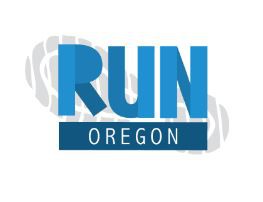
Joe and teammate Brian Hansen thinking and running at the 2014 Big Muddy orienteering meet in central Oregon
Competitive racing and thinking don’t always go hand in hand. When I’ve raced my hardest, the effort was so extreme that I usually just concentrated on putting one foot in front of the other and vowed to retire from racing the second I crossed the finish line. I’m exaggerating of course, but that’s not far from the truth.
Besides thoughts of “There’s no way I can keep this up!”, “I think I’m about to collapse in the ditch”, and “Where’s the $@&# finish line?!”, there have been rare occasions when a cogent idea crossed my mind and actually helped my race.
During the Oregon Road Runners Club’s annual New Year’s race one January, I was dueling neck and neck with another runner for much of the race. As we matched strides across the valley outside of Forest Grove, I plotted my strategy: I would wait until the final steep hill near the finish that taunts every runner, and push as hard as I could up it. If my competitor was able to duplicate my effort, more power to him. But if I took him by surprise and he couldn’t respond, I would have succeeded in my only chance at pulling away. The hill came, I gave it everything I had, and it worked! The other guy fell behind just enough to allow me to hold him off down the stretch.
Another time, I was racing a 5K at Laurelhurst Park, and again I was running shoulder to shoulder with another guy for virtually the whole race. One of us would increase the pace and the other would stay right there. We kept going faster and faster along the winding paths, ratcheting up the effort, neither of us conceding an inch. With about a mile to go, I began to think about the finish. I drew on my memory of the course map and visualized the last corner and the long straightaway toward the line. I decided on a plan: I would continue to hang with my rival as best I could, and if we were still running together at that final turn I would try to catch him off guard with a sudden burst, and push as hard as I could down that final few blocks to the finish. We were still side by side when the corner came, and I gave it all I had left. Once again it worked!
Those two races are rare examples of occasions when I was able to simultaneously run at the limits of my ability AND compose a coherent plan in my head. Most of the time my head is simply echoing with thoughts of “Keep going!” and “Why do I keep doing this every weekend?!” Sometimes, I’m lucky enough to come up with a few “hooks” for a humorous race recap.
Lately, with nothing really left to prove, and the novelty of running so hard I think I might keel over at any moment finally starting to wear off, I have started to enjoy combining running and thinking in different ways: Orienteering, urban adventure races, scavenger hunts, and Team Red Lizard’s annual Tour de Goose. These events combine running with map reading, puzzle solving, and other challenges, often with teammates, and provide a satisfaction beyond merely getting from Point A to Point B as quickly as possible.
Don’t get me wrong, these events still reward speed and provide an outlet for competitiveness. But nothing can match the excitement of rounding a hill and spotting the orange “control” and knowing you’ve read the map correctly. Or solving a puzzle and discovering the location of the next checkpoint. Getting there quickly is just icing on the cake. Thinking is not just a rare luxury in these events; it’s a necessity.
To some extent, racing a 5K as hard as you can involves leaving your thought process at the starting line. Otherwise, you probably wouldn’t be able to push your body to its limits. Outrun your brain at these other events, however, and you will soon find yourself at the bottom of the results, having missed some clues or misread the contour lines.
So the next time you find yourself thinking on the run, consider trying some of these brain teasing events. You don’t have to be a member of Mensa to succeed (and you don’t have to run like Galen Rupp), but you do have to be smarter than your average 5K fanatic!
For more information about orienteering check out the Columbia River Orienteering Club website.




